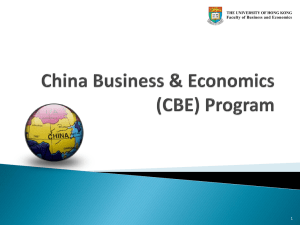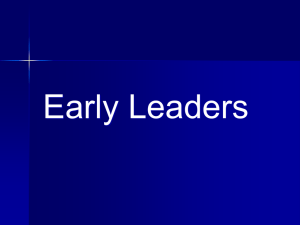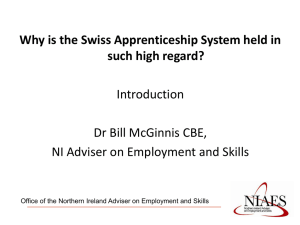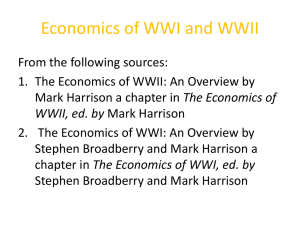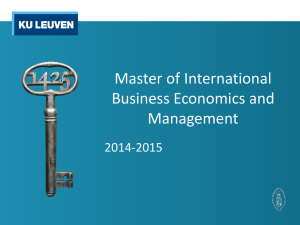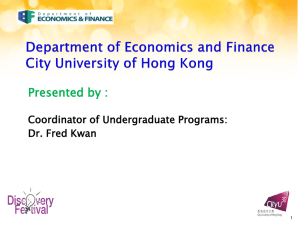question 1 - University of Queensland
advertisement
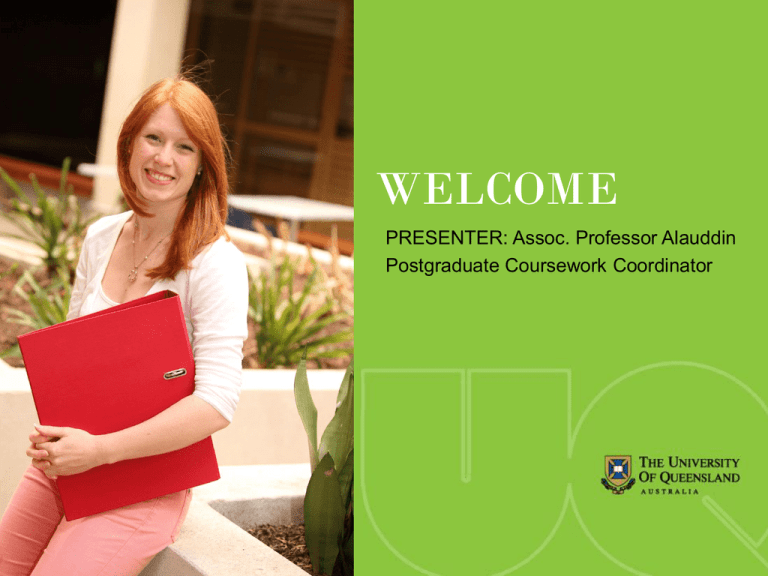
EXPLORING WELCOME YOUR OPTIONS PRESENTER: Assoc. Professor Alauddin Postgraduate Coursework Coordinator WHO AM I? Associate Professor Mohammad Alauddin Postgraduate Coursework Coordinator Room 640, Colin Clark Building Phone: 336 56664 Email: m.alauddin@uq.edu.au WHO AM I? Qualifications: • BA (Hons)– Rajshahi, Bangladesh • MA - Rajshahi, Bangladesh • MEcon - Adelaide • PhD (Economics) – Newcastle, NSW • GradCertEducation – UQ • PhD (Education) - UQ Research Interests: • Agricultural Economics • Development & Environmental Economics • Pedagogy & Curriculum Development A BIT ABOUT THE SCHOOL OF ECONOMICS The UQ School of Economics is highly regarded as one of the leading Economics departments both Internationally and on the Domestic front. The link between Economics and The University of Queensland has been existing for some 100 years even though the School of Economics became its own entity in 1947 and was one of the university’s foundation principles. The School of Economics ranks among the top 50 Economics departments in the world and has a strong research and publication history. “In December 2012, RepEc ranked UQ Economics as 43rd out of 1858 Economics departments internationally. RePEc, is a collaborative effort of academics in 71 countries worldwide that ranks 10, 700 institutions worldwide. Microeconomic Theory Economic Theory Econometrics & Stat. Methods RESEARCH STRENGTHS Game Theory Health Economics Econ Dev & Growth Agricultural Economics CrossSectional Anaylsis Econometrics Panel Data Anaylsis Time-series Analysis & Forecasting Environmental & Resource Economics Experimental, Behavioural & Evolutionary Methods Applied Economics International Economics Macroeconomics Productivity & Efficiency Analysis Industry Economics & Industrial Organisation SEMESTER 1 2014 INTAKE The commencing students for semester 1 2014 can be seen below for each of the Postgraduate Coursework Programs offered by the School of Economics. Currently the number of students enrolled for their first semester of study is 133. Program Code Program Name 5010 Graduate Certificate in Economics 5399 Students Program Code Program Name Students 6 5077 Graduate Diploma in Economics 17 Master of Economics 1 5469 Master of Development Economics 6 5185 Master of International Economics & Finance 35 5470 Master of Development Economics (Advanced) 10 5376 Master of International Economics & Finance (Advanced) 26 5391 Graduate Diploma in Health Economics 4 5245 Master of Business Economics 5 5418 Master of Health Economics 9 5372 Master of Business Economics (Advanced) 1 5419 Master of Health Economics (Advanced) 3 5545 Master of Economics and Public Policy 7 5545 Master of Economics and Public Policy (Advanced) 1 AND…LIFE AFTER ECONOMICS…… Having graduated from the UQ School of Economics is your ticket to a diversity of domestic and international career opportunities – careers you may not even know exist. You will find yourself among the most highly paid graduates from business related disciplines. Key Employment Sectors: • Banking, Finance & Insurance • Government (treasury, transport, health, agriculture & environment) • International Development or Foreign Affairs • Management • Academic • Private Consulting You could choose to seek employment as an analyst, policy advisor, consultant or economist in the public or private sectors. AND…LIFE AFTER ECONOMICS…… What happens to UQ Economics graduates after graduation? YOUR QUESTIONS & COMMENTS Eecon.pgrad@uq.edu.au HOW WELL DO YOU KNOW ECONOMICS AND UQ? Postgraduate Orientation Session Icebreaker RULES OF THE GAME • Very simple – trivial pursuit type game • Find your group (look at the colour card you were given when you arrived) • Move to your group area (look at the walls for your group colour) • A set of questions will be asked about a range of famous Economists & UQ • Discuss within your group and answer them as a team QUESTION 1 Who is this famous Economist? Hint: I’m also a famous sociologist, journalist, historian and philosopher QUESTION 1 ANSWER Karl Marx Karl Marx has been described as one of the most influential figures in human history. His work laid the basis for the current understanding of labour and its relation to capital. QUESTION 2 What is the most important concept David Ricardo developed in his 1817 work “On the Principles of Political Economy and Taxation”? a) Gross Domestic Product b) Comparative Advantage c) You know the economy is in crisis when your underwear is old d) The more Starbucks outlets a country has, the higher its taxes QUESTION 2 ANSWER What is the most important concept David Ricardo developed in his 1817 work “On the Principles of Political Economy and Taxation”? b) Comparative Advantage David Ricardo, published "On the Principles of Political Economy and Taxation" in 1817 and in it he developed the idea that nations should produce what they are best at compared to other goods. From this specialisation, along with freer trade, nations can increase the wealth of its producers and make goods more inexpensive for the consumer. QUESTION 3 Which economist is credited with influencing Ronald Reagan and Margaret Thatcher with his "The Road to Serfdom"? a) b) c) d) Milton Friedman Thomas Malthus Friedrich Hayek Donald Duck QUESTION 3 ANSWER Which economist is credited with influencing Ronald Reagan and Margaret Thatcher with his "The Road to Serfdom"? c) Friedrich Hayek In his 1944 work, Hayek argues that any sort of "planning" by the government in economics will eventually lead to the rule of the few, those who do the planning, over the many, who eventually become nothing more than serfs to the few. QUESTION 4 Who wrote “The General Theory of Employment, Interest, and Money”? a) b) c) d) Paris Hilton John Maynard Keynes Friedrich Hayek Professor Flavio Menezes QUESTION 4 ANSWER Who wrote “The General Theory of Employment, Interest, and Money”? b) John Maynard Keynes In his 1936 work, Keynes theorized that to achieve "full employment" of labour and capital, government spending, even into deficit, should be made to increase the "aggregate demand" on goods and services. QUESTION 5 What UQ building is the home of the UQ School of Economics? a) b) c) d) Colin Clark Building General Purpose North Building Forgan Smith Building Gordon Greenwood Building QUESTION 5 ANSWER What UQ building is the home of the UQ School of Economics? a) Colin Clark Building Colin Clark (1905 –1989) was a British and Australian economist and statistician who pioneered the use of the gross national product ("GNP") as the basis for studying national economies. He also worked at UQ for a time. QUESTION 6 What time of the year do the Jacaranda trees flower on the UQ campus? What colour do they bloom? QUESTION 6 ANSWER The Jacaranda tree blooms brilliant purple in October and November Legend has it that if a Jacaranda flower lands on your head, you will fail your exams. Don’t worry … it’s just a myth! QUESTION 7 Who argues in "Capitalism and Freedom" that government, despite good intentions, often did more harm than good upon entering the economic arena, and therefore should stay out of it whenever possible? a) b) c) d) Daron Acemoglu Milton Friedman John Maynard Keynes Jay-Z QUESTION 7 ANSWER Who argues in "Capitalism and Freedom" that government, despite good intentions, often did more harm than good upon entering the economic arena, and therefore should stay out of it whenever possible? b) Milton Friedman In his 1962 book, Friedman argued against the prevailing wisdom of Keynesian economics that had predominated the Eisenhower and Kennedy administrations. Friedman won the 1976 Nobel Prize in Economics. QUESTION 8 Which of the following will Economics students NOT find in the UQ library: a) b) c) d) Quiet study rooms and 24/7 study spaces Books and online databases Friendly and helpful librarians Keeping up with The Kardashians box set QUESTION 8 ANSWER Which of the following will Economics students NOT find in the UQ library: d) Keeping up with The Kardashians box set But you will find a great number of textbooks and readings, books and databases, study rooms, computers for your use and friendly staff to help you research. The library also has an online multimedia database with foreign, Australian and selected Hollywood films http://www.library.uq.edu.au/teaching-support/video-streamsdemand QUESTION 9 Who am I? Born in 1946 in Perth, I earned my Bachelor of Arts from the Australian National University in 1967, and a PhD in 1972. During my career, I was a senior Economic Advisor to Prime Minister Bob Hawke (1983-85), Chairman of Primary Industry Bank of Australia (1989 – 1994), Chairman of Bank West (1988 – 1995), Research Director of the ASEAN-Australia Economic Relations Research Project, amongst other roles. In April 2007, I was appointed to examine the impacts of Climate Change on the Australian economy. Up until 2011, I was a Climate Change Advisor to the Australian Government. QUESTION 9 ANSWER Ross Garnaut Distinguished Professor of Economics at The Australian National University and a ViceChancellor’s Fellow at The University of Melbourne. QUESTION 10 Which famous Australian Economist working at UQ Economics wrote a book linking Economics to Zombies? a) b) c) d) Flavio Menezes John Quiggin Paul Frijters Bruce Willis QUESTION 10 ANSWER Which famous Australian Economist working at UQ Economics wrote a book linking Economics to Zombies? b) John Quiggin John is also an Australian Research Council Federation Fellow, and a member of the Board of the Climate Change Authority of the Australian Government. QUESTION 11 What is Mohammad Alauddin’s most favourite food? a) b) c) d) Rice Daal Fish All of the above QUESTION 11 ANSWER What is Mohammad Alauddin’s most favourite food? a) Rice Postgraduate Welcome School of Economics Martin Cvelbar Librarian, Research Information Service St Lucia Library services • Library Homepage http://www.library.uq.edu.au/ • Borrowing • Coursework and Research students have different loan periods, • Penalties apply for late return of loans. • Ask IT http://www.library.uq.edu.au/ask-it • for IT technical support of University resources. • Document Delivery • for items not held by UQL related to your research. • Library Help • In person at any branch or via chat or email through MyLibrary Research Information Service • RIS Librarians can assist in your research with: • Information research enquiries, • Individual research consultations, • Staying up-to-date with literature in the discipline, • Bibliographic management tools such as Endnote • We also help with information literacy classes. Graduate Economics and Business Library • A dedicated postgraduate study space • Located in the Colin Clark Building, it comprises 2 areas: • Quiet discussion and group rooms, • Computer room with 30 computers and printing facilities. • The computer room is a shared space between the School and the Library and may be booked by either. • The group rooms are bookable via • Swipe card access between 6pm and 8am. Library 101 A self-paced tutorial will guide you through all the things you should know about your Library. There are links to Checklists, Activities and Quizzes that will allow you to assess your understanding of that module. https://www.library.uq.edu.au/help/online-tutorials Library Workshops • Assignment Research – Business & Economics • Find it! Company and Market • Find it! Google and Google Scholar • Find it! News and Media • Use it! Refworks http://www.library.uq.edu.au/training Library Tours Virtual Tours via http://www.library.uq.edu.au/locations In the SSAH Library O-week and Week 1 10am, 12 noon, and 2pm Librarian for Economics Martin Cvelbar Librarian, Research Information Service – St Lucia Email: m.cvelbar@library.uq.edu.au Telephone: 3346 3553 School of Economics www.uq.edu.au/economics Postgraduate EXPLORING Coursework Orientation YOUR OPTIONS Seminar PRESENTERS: Rachel Panousis & Julie Waldon 24 February 2014 Mobile Phones Please ensure all mobile phones are switched off or to silent. Where to Start? Courses & Programs Website http://www.uq.edu.au/study/ Program Information: including entry requirements, courses of study, program descriptions and rules, course schedule Course Information: including required pre-requisites and current and past course profiles. http://www.uq.edu.au/myadvisor/ : contains a wide variety of general information for new and current students. You can also access all forms required while enrolled at UQ from this website. Remember: www.uq.edu.au/economics/currentstudents School of Economics website contains: * * * Suggested study plans Frequently Asked Questions (FAQs) Information on all PG Coursework programs Please consult this page for assistance, but feel free to contact one of the Administrative Officers should you still require assistance. econ.pgrad@uq.edu.au Who Are We? For questions relating to your program of study, you can contact: Mrs Rachel Panousis Phone: 3365 6578 Ms Julie Waldon Phone: 3365 6684 Where can you find us? Room 624 (6th Floor) Colin Clark Building – School of Economics How do you contact us? The email address for Postgraduate Coursework is: econ.pgrad@uq.edu.au What do we do? We offer advice on and are involved in the processing of : * * * * * * * * * * Course Progression Program Requirements Program Change Request processes Credit/Exemption Application & Course Assessment processes Progression planning following failing of compulsory courses Cross Institutional Information & Application processes Approval of Study Plan courses for International Exchange in conjunction with the BEL Faculty officer Approval of requesting to complete an elective courses not on Part B of your program list (i.e. a Non-Scheduled Elective) Applications to Extend Studies and for New CoE (International Students) Resolution of enrolment issues (mySI-net Error messages) Should you wish to discuss any of the above please email for an appointment with an Administrative Officer: economics@uq.edu.au or econ.pgrad@uq.edu.au What don’t we do? We are not able to: * * * * * Complete forms on your behalf Enrol you in your courses Make decisions about the Exemption/Credit of courses from previous studies Advocate for you in Academic matters Advise on the academic content of courses Who else can Assist me? Associate Professor Mohammad Alauddin Postgraduate Coursework Coordinator School of Economics m.alauddin@uq.edu.au Ms Megan Sandaver Manager, Coursework Students & Programs School of Economics m.sandaver@uq.edu.au Exemptions If you have completed an equivalent course in your undergraduate studies you may be eligible for an exemption from compulsory courses. To apply for an exemption you must submit the form located at: http://www.uq.edu.au/myadvisor/forms/enrolment/credit-exemptions.pdf Please ensure you supply detailed course outlines at the time of submitting your application. To receive an exemption from a compulsory course, the course coordinator must be satisfied that you would not be placed at a disadvantage by not completing the course at The University of Queensland. If you have completed these courses at UQ you will not be required to submit course outlines. Receiving an exemption does not reduce the number of courses that you must complete to be awarded your degree. You should replace any exempted compulsory courses with an elective from Part B of your program course list. Credit If you have completed equivalent courses at a Postgraduate Level at another institution, you may be entitled to CREDIT. To receive credit you must apply using the form located at: http://www.uq.edu.au/myadvisor/forms/enrolment/credit-exemptions.pdf Please ensure that you submit detailed course outlines at the time of submitting the application for credit. To receive credit from a course, the course coordinator must be satisfied that you would not be placed at a disadvantage by not completing the course at The University of Queensland. If you have completed these courses at UQ you will not be required to submit course outlines. Receiving CREDIT reduces the number of courses you must complete to be awarded your degree. You do not need to replace courses that you are awarded credit for. Choosing Courses to Study in my Program Each program of study contains a certain number of compulsory (Part A) courses – courses that you must study that form the foundations for your particular program of study. In addition to the compulsory (Part A) courses there is also room for a number of elective (Part B) courses, that can be selected from a number relevant to your program of study and that will build on the foundations of your program. At times students may find a course that may not be on the Part B list of courses for their particular program but wish to study it to add to their knowledge base or to assist with their employment later on. You must apply via the Administrative Officer and receive permission to be given credit for an elective course not included in Part B. This is called a non-scheduled elective course. If the course is approved the Administrative Officer will advise you by email and will place a noting on your studies report on mySI-net so that when you are due to graduate this course is credited to your program of study. For further information, please contact econ.pgrad@uq.edu.au Study Plans Sample study plans are available on the School of Economics website at: http://uq.edu.au/economics/custompages/studyplan2013.php Should you wish to discuss your study plan with an Administrative Officer, please email for an appointment. Please outline the reason for your appointment in your email. Please ensure that you include your student number in all correspondence. It is imperative that you plan your study if you are on an articulation plan or are considering requesting a program change and/or early exit from a suite of programs. International Students: should enrol in 4 courses (#8) per semester unless you have an alternative study plan approved which may included Summer Semester courses to enable completion of your program within the normal duration. School of Economics Postgraduate Coursework Programs • • • • • • • • • • • • • • Graduate Certificate in Economics (#8) Graduate Diploma in Economics (#16) Master of International Economics & Finance (#24) Master of International Economics & Finance Adv. (#32) Master of Business Economics (#24) Master of Business Economics Adv. (#32) Master of Development Economics (#24) Master of Development Economics Adv. (#32) Master of Economics & Public Policy (#24) Master of Economics & Public Policy Adv. (#32) Master of Economics (#32) Graduate Diploma in Health Economics (#16) Master of Health Economics (#24) Master of Health Economics Adv. (#32) Code: 5010 Code: 5077 Code: 5185 Code: 5372 Code: 5245 Code: 5376 Code: 5469 Code: 5470 Code: 5545 Code: 5546 Code: 5399 Code: 5391 Code: 5418 Code: 5419 • Articulating Students should organize an appointment to discuss their course plan. Pre-Requisites = The course(s) that must have been previously passed to be able to enrol in a particular course. A pre-requisite course will provide the foundation knowledge for you to progress to the next level of course. It is the student’s responsibility to ensure that they have completed all required prerequisites when enrolling. Pre-requisite requirements will be listed via the Programs & Courses website. In your 1st semester of study most plans will suggest that you enrol in: * * * ECON7010 Consumer & Firm Behaviour ECON7020 The Macroeconomy ECON7300 Statistics for Business & Economics PLUS one other course. The three courses listed above provide the building blocks for most other Economics courses. Program Change Requests All students should request program changes via mySI-net. This request is available following the official release of grades until the Friday before Orientation Week each semester. Log into Drop Down Select mySI-net myPage Personal Program Program Summary Graduation Semester Plans Study Load Enrolment Status Report Program Change Request Courses Submit Form Program Change Requests You should be aware that to be approved to change programs from one Postgraduate Coursework program to another that you must meet the required GPA for that program. For example: If you are currently enrolled in the Master of Development Economics and you wish to change programs to the Master of Development Economics (Advanced), you would need to have a cumulative GPA of at least 4.75 in order for your request to be approved. If you do not have the required GPA it is most likely that you will be denied your program change request. Please ensure that you are enrolled in the correct program of study. Exchange Study To complete some of your Postgraduate Degree at an overseas institution is a wonderful opportunity and experience. Students undertaking Master’s Degrees are eligible to apply for exchange studies. If you are interested please check out http://www.uq.edu.au/uqabroad/ . You will find experiences shared by other students who have taken the opportunity to be part of the exchange study program. Another link to have a look at is via the BEL Faculty “Study Overseas on Exchange at http://www.bel.uq.edu.au/exchange. This will highlight eligibility requirements as well as information sessions that BEL Faculty arrange. The first point of contact for your application should be Ms Anneliese Berglind who can be contacted at the BEL Faculty by email on exchange@bel.uq.edu.au . If you are considering Exchange studies you should start planning now as there is a lot of necessary planning that must take place for an exchange to eventuate. International Students - Visas As an international student you will be issued a visa for the required length of your program of study. You must enrol in 4 courses per semester as per your program plan. If you do wish to vary the suggested plan you should contact the School and make an appointment with one of the PG Coursework Administration officers for assistance. Should you not enrol in a manner that will facilitate the completion of your program within the regular time frame i.e. 3 semesters for a #24 Masters or 4 semester for a #32 Masters you are at risk of your visa extension not being approved. For example if you enrol in a course that you do not have the required pre-requisite background. If you fail a course, you should contact the Administrative Officer/s for assistance in planning your program to completion. You may be able to catch up over summer semester by studying one of the courses that are on offer for your Program of Study. In some circumstances it may be that the only way to complete the program of study is for a visa extension/renewal of COE. If this is the case and you have enrolled in correct manner previously, usually your visa extension will be recommended and/or approved. If you are concerned please contact econ.pgrad@uq.edu.au Examination Period 7 – 13 June Revision Period 14 – 28 June Examination Period 28 June Semester 1 ends 23 – 25 July Deferred & Supplementary Examinations held Important Dates All important dates can be found on the website Starting at UQ http://www.uq.edu.au/startingatuq/ 3rd March – Semester 1 begins 14th March – Last date for addition or substitution of courses on mySI-net & due date for payment of fees and charges 31st March – Semester 1 Census date – Last date to drop courses without financial penalty 30th April – last date to drop courses without academic penalty – financial penalty remains Mid-Semester Break – 21 – 27 April Opportunities INTERNATIONAL EXCHANGES: www.bel.uq.edu.au/exchange Start planning your exchange now – the application process takes 12 months; BEL EMPLOYMENT SERVICES: www.bel.uq.edu.au/careers Short term internship placements with a range of organisations; Volunteer placements in Australia and internationally; Graduate roles with some of the world’s largest organisations; Network with employers, industry professionals and alumni; EVENTS AND PRESENTATIONS: http://www.bel.uq.edu.au/alumni/events-calendar.html A listing of Faculty and School events for Business, Economics & Law EVENTS AND PRESENTATIONS – ECONOMICS: http://www.uq.edu.au/economics/ A listing of School of Economics Seminars and events YOUR QUESTIONS & COMMENTS econ.pgrad@uq.edu.au

